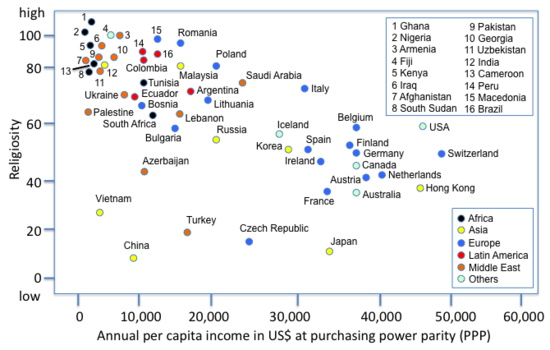Wealth and religion
The correlation between wealth and religion has been subject to academic research. Wealth is the status of being the beneficiary or proprietor of a large accumulation of capital and economic power. Religion is a cultural system that often involves belief in supernatural forces and may intend to provide a moral system or a meaning of life.

Generally, there is a lack of correlation between wealth and religiosity. Jews, Unitarians, and Episcopalians typically rank as the highest income groups. Countries with high religiosity do as well on GDP per capita as countries with low religiosity. [2]
Statistics
Global
According to a study from 2015, Christians hold the largest amount of wealth (55% of the total world wealth), followed by Muslims (5.8%), Hindus (3.3%), and Jews (1.1%). According to the same study it was found that adherents under the classification Irreligion or other religions hold about 34.8% of the total global wealth.[3]
A study done by the nonpartisan wealth research firm New World Wealth found that 56.2% of the 13.1 million millionaires in the world were Christians,[4] while 6.5% were Muslims, 3.9% were Hindu, and 1.7% were Jewish; 31.7% were identified as adherents of "other" religions or "not religious".
United States

A study in the United States (based on data from 1985–1998), conducted by the sociologist Lisa A. Keister and published in the Social Forces journal, found that adherents of Judaism and Episcopalianism[5] accumulated the most wealth, believers in Catholicism and mainline Protestants were in the middle, while conservative Protestants accumulated the least; in general, people who attend religious services accumulated more wealth than those who do not (taking into account variations of education and other factors).[6] Keister suggested that wealth accumulation is shaped by family processes.[7] According to the study, the median net worth of people believing in Judaism is calculated at 150,890 USD, while the median net worth of conservative Protestants (including Baptists, Jehovah's Witnesses, Seventh-day Adventists, Christian Scientists) was 26,200 USD. The overall median in the dataset was 48,200 USD.
Another study in the United States, from 2012, stated that 48% of Hindus had a household income of $100,000 or more, and 70% make at least $75,000, which is the highest among all religions in United States.[8]
According to a 2014 study by the Pew Research Center, Jewish again ranked as the most financially successful religious group in the United States, with 44% of Jews living in households with incomes of at least $100,000, followed by Hindu (36%), Episcopalians (35%), and Presbyterians (32%).[9] Amongst Jews, in 2016, Modern Orthodox Jews had a median household income of $158,000, while Open Orthodoxy Jews had a median household income of $185,000 (compared to the American median household income of $59,000 in 2016).[10] According to the same study there is correlation between education and income, about 77% of American Hindus have an undergraduate degree, followed by Jews (59%), Episcopalians (56%), and Presbyterians (47%).[11]
Explanations
A study published in the American Journal of Sociology by Lisa Keister, found that "wealth affects religion indirectly through educational attainment, fertility, and female labor force participation" but also found some evidence of direct effects of religion on wealth attainment.[12] Keister notes that certain religious beliefs ("one should have many children", "women should not work") lower wealth accumulation, both on the micro- and macro-scale.[12][13]
See also
References
Footnotes
- WIN-Gallup. "Global Index of religion and atheism" (PDF). Retrieved 21 October 2012.
- Survey Reports (2007-10-04). "World Publics Welcome Global Trade — But Not Immigration | Pew Global Attitudes Project". Pewglobal.org. Retrieved 2011-10-21.
- "Christians hold largest percentage of global wealth: Report". deccanherald.com. 2015-01-14.
- The religion of millionaires
- Allen 1975.
- "Religion Helps Shape Wealth Of Americans, Study Finds". Researchnews.osu.edu. Retrieved 2011-10-21.
- Keister 2003.
- "Asian Americans: A Mosaic of Faiths". 2012-07-19. Retrieved Dec 1, 2012.
- "How income varies among U.S. religious groups". Pew Research Center. 2016-10-16.
- 5 key takeaways, some surprising, from new survey of US Modern Orthodox Jews By BEN SALES 30 September 2017, JTA
- "The most and least educated U.S. religious group". Pew Research Center. 2016-10-16.
- Keister 2008.
- Keister, Lisa A. (2 November 2011). "How Religion Contributes to Wealth and Poverty". The Huffington Post. Retrieved 19 November 2017.
Bibliography
- Allen, Irving Lewis (1975). "WASP: From Sociological Concept to Epithet". Ethnicity. 2 (2): 153–162.CS1 maint: ref=harv (link)
- Keister, Lisa A. (2003). "Religion and Wealth: The Role of Religious Affiliation and Participation in Early Adult Asset Accumulation". Social Forces. 82 (1): 175–207. doi:10.1353/sof.2003.0094. ISSN 0037-7732. JSTOR 3598143.CS1 maint: ref=harv (link)
- ——— (2008). "Conservative Protestants and Wealth: How Religion Perpetuates Asset Poverty". American Journal of Sociology. 113 (5): 1237–1271. CiteSeerX 10.1.1.485.120. doi:10.1086/525506.CS1 maint: ref=harv (link)
Further reading
- Van Biema, David; Chu, Jeff (2006). "Does God Want You to Be Rich?". Time. Vol. 168 no. 12. Retrieved 19 November 2017.
- Weber, Max (1930) [1905]. The Protestant Ethic and the Spirit of Capitalism. Translated by Parsons, Talcott. New York: Charles Scribner's Sons. OL 17967952M.